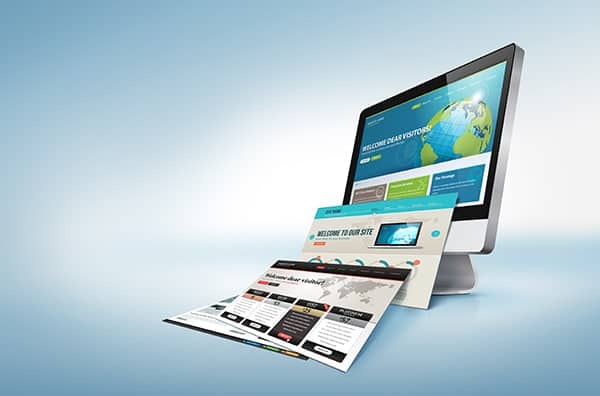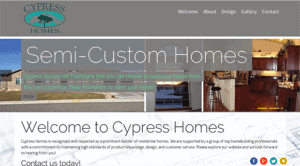When someone tells me, “Josiah, I need a website” my next question would be, “What kind of website do you need?”
One of the most rewarding things as a professional web designer is to share my passion for building websites. My eyes light up whenever I have an opportunity to educate my clients on all things related to website design and the Internet. It’s a moment that allows me to inform people how websites can benefit their business, improve their way of life and at the same time dispel popular misconceptions.
Most people think a website is just their address on the World Wide Web. All you have to do is click on the URL or paste it on the address bar and you’ll land on the website. Although oversimplified, the definition is fairly accurate.
But if you need a website, the more important considerations are as follows:
- What would make people want to click on my URL?
- What would they do once they are in my website?
- How would the website help me achieve my goals or meet my objectives?
A website is more than just an address on the World Wide Web. With proper planning, strategy and purposeful design, a website can do more than just give you presence in the Internet.
What is a Website?
Rather than proceed with a technical, textbook definition of what a website is, I will instead do an analogy.
Let’s assume you decided to get into the restaurant business. Planning a restaurant would entail the following activities:
- Market research
- Developing a concept
- Planning and testing of menu items
- Functional design of the kitchen
- Ordering, payment and checkout system
- Reporting system and collating sales data
- Interior design and aesthetics of the restaurant
- Marketing and promotional campaign
- Recruitment, selection and training of personnel
- Testing of kitchen equipment, POS and food ordering systems
- Design of menus or menu boards
All of these activities are further broken down into smaller tasks. For example, designing the layout, interiors and aesthetics of the restaurant would require you to do studies on your target demographics. You hope to find out the best combination of design elements that will attract your target market to your restaurant.
What colors best represent the type of food that I plan to serve? What kind of music do my customers want to listen to? What type of look should my interiors go for in order to create the perfect dining experience for my customers? What would be the average group size of my patrons?
The point of the analogy is that when you decide to open a brick and mortar business like a restaurant, you don’t just set one up without meticulous planning and strategy. You run different studies, conduct thorough research and testing to make sure you can minimize the risks of the business.
The only difference between a website and a brick and mortar business is its location.
With a website you operate in the World Wide Web. But that singular difference opens up a whole new set of advantages:
- Your website business is open 24/7.
- Lower maintenance costs; hosting fees and periodic updates or improvements.
- Immediate access to performance data.
- Easier to implement changes; with the restaurant, a renovation means you will have to shut down operations for a few weeks.
- Unless you are running a services-based business, you don’t need to hire personnel.
You can read up on thebenefits of having a website from my previous article. But to understand what a website is and what it can do, all you need to do is to change the conditions of building a business from the physical world to the virtual world.
As the web designer, my job is to build you a website based on the research and information you provide. You are the expert in what you do. My primary function is to come up with a website design that will help you achieve your goals and meet your objectives.
Tell me about your business or purpose and I’ll design you a website that meets your needs.
What is a Content Management System (CMS)?
Before I go to the different types of websites, it would be a good idea to discuss what a CMS or Content Management System is and why it’s an important feature for your website.
The CMS allows you to control the content of your website. Whether you use the website for business or for personal sharing, I believe it should have a CMS for the simple reason that it should be dynamic and remain ever-evolving.
Conditions in business and life are never static. Every day you go through different experiences that shape your business and influence its direction. The same goes for your audience. The demographics of your audience may change without prior notice.
In a globalized economy, what happens in one part of the world affects other regions as well. Changes in the world will affect your business strategies and could influence your values, purpose and vision.
If the website is your address on the World Wide Web, then it should be allowed to grow and reflect the changes that you go through. The CMS makes this possible.
The Different Types of Website
When you decide to have a website for your business, it doesn’t mean you have to sell products or services online. Of course you can. However, your website can play other roles that are likewise pivotal to the success of your business:
- Build a larger fan or follower base.
- Enhance your reputation as an expert or valuable resource.
- Educate or inform your market about your business.
- Establish communities of people who share the same interests.
- Market and promote your business.
The type of website your business needs would depend on your goals, objectives and its purpose in your overall development strategy.
- Personal Website – Your ISP may offer you free server space to set up a personal website. Some people use this type of website as a blog or an online diary. But you can use a personal website for building your brand.
For example, if you are a Personal Fitness Trainer, you can use the personal website to share your views and opinions on exercise through blogs. You can create a timeline of your weight loss journey, post photos, your workouts, diet plans then share the content through social media.
- Search Engine Directories, Yellow Pages and Portals – Google, Yahoo! and Bing are the most popular search engine websites. This type of website offers a variety of features and services to the user from e-mail to information.
Classified directories such as the Yellow Pages provide listing services for businesses, both online and offline. Many include an internal search engine to help users find the desired information.
- Information Websites – You can have a website that shares information whether paid or not. You may want to have this type of website if you are catering to a niche industry.
A good example would be an information website on investment opportunities if you are a professional Fund Manager. Your website can be a portal where users can access information on different markets including stocks, treasury bills, foreign exchange, commodities and real estate.
An information website will be an effective way of building your brand and enhancing your image as an expert in the industry. You can create a Facebook page to share content that links back to your website and generate more viewers.
Company Websites – In the days before the Internet became accessible via broadband technology, websites were used as a marketing tool. Companies set up websites not only to provide information on their business but to show the audience they were updated in technology. Think of company websites as “virtual brochures”.
Today, company websites are more than just marketing collateral. You can find company websites that are more interactive and functional. Many have a Career Page where job seekers can look for openings and send their application.
The company also uses the website to inform their end users, employees and everyone on the value chain about changes in management, the board of directors and latest developments.
- Blog Sites – The blog has evolved from an online diary into a powerful tool for generating inbound traffic. It has become the cornerstone of the Content Marketing Process. This is why many types of websites; company, personal and e-commerce to name a few, have a built-in blog page.
People spend 21% of their time searching for information and 20% reading content on the Internet. For your blog to be effective, it must be found. Being a prolific writer is not enough. You must know how to optimize your page with the use of keywords and relevant links. Writing a blog has become as much as a science as it is an art form.
A blog website can generate significant income. There are quite a number of blog sites that make thousands, even millions of dollars every month. They earn income from advertising and the more followers you have the more attractive your website becomes to advertisers.
- Forums or Community Building Websites – This type of website caters to a specific niche. The purpose is to bring together people with the same interests and have a venue or forum for sharing thoughts, ideas and opinions.
A forum or community website is effective for:
- Building networks, expanding your contacts list.
- Promoting products and services.
- Creating support groups.
- Disseminating information.
- Strengthening collectives or interest groups.
An example of a forum would be those that deal with supplements. There are a number of forums and online communities that frequently share ideas and opinions on different types and use of supplements.
Supplement companies give beta testers samples of their products on a monthly basis in exchange for a positive review on these community websites. Testimonials and product reviews are powerful drivers of business because these are seen as “honest”.
Social media networks such as Facebook, LinkedIn and Google Plus can be considered community building websites because they bring people of common interests together.
- E-Commerce or Retail Websites – Over the last few weeks, we’ve read news that a number of popular retailers in the United States are closing outlets or losing business. Billionaire investor Warren Buffet divested $900M worth of holdings at Wal-Mart.
Retail market analysts point to e-Commerce as the catalyst for the reversal in fortunes of these once- mighty malls. Sales from e-Commerce has consistently been increasing since it first broke through the $1 Trillion mark in 2012.
As I mentioned in my article “Why Your Website Needs Responsive Design”, the growth of smartphones will outgrow the population of the world. Consumers are increasingly dependent on the Internet to meet their needs and this includes shopping.
An e-commerce website is more complicated to make. It will need a products page with high resolution images, “zoom-in, zoom out” or “enlarge” features. You will also need a payment system in place plus a shopping cart to finalize all transactions.
Of course, it has to be mobile responsive, fast and highly accessible by multi-browsers. An e-commerce website will require a larger investment but it would be significantly less than setting up a physical establishment.
- File- Sharing Websites – These types of websites are similar to community websites in the sense that they cater to people who share the same interests. However, these interests may have specific niches.
Good examples would be websites that allow users to share music, movies or photos. Some of these websites even offer free memberships that can be upgraded for a reasonable fee so you can enjoy additional features.
You will need a powerful internal search engine in the event the number of files begins to encroach upon the website’s capacity.
- Work Collaboration Websites – More businesses are starting to outsource work to remote third party service providers.
In the United States, 37% of workforces are composed of virtual assistants or telecommuters. This number is expected to increase to 50% or higher in 2020. Businesses have been aggressively outsourcing tasks in order to reduce costs without compromising productivity.
Work collaboration websites such as Asana, Salesforce and Evernote, enable businesses to work together with their remote teams. These websites have features for project management, file- sharing, planning, campaign management and communication.
Some of these websites offer free memberships that include the basic features. A monthly subscription fee will entitle the user to more features and benefits that can help grow their business.
So Which Website Type Is For You?
These are just 9 of the most popular types of websites that you can consider for your business. The type of website you choose should service the needs of your audience, enhance your business presence and highlight the products or services you are offering.
Would it be possible to have a website that incorporates features of other types of websites?
Yes, again the type of website would depend on your business needs. As discussed, company websites have evolved and integrated other features such as a blog page and a Career page. A blog page gave these companies a platform to share and engage with their customers and clients. A Career page gave them a new platform to recruit talent.
You can have an informational website that has a products and services page with a shopping cart. You could start out by building your brand and establishing your reputation as an expert in the industry through frequent blogging and posting of relevant articles. Once you have acquired a large group of followers, you can transition to an e-commerce website and sell products and services.
To find out which type of website is right for you, review your business model and conduct studies on your industry and target market.
If you’re thinking about having a website, feel free to contact us at Mountaintop Website Design. We have done different types of websites to suit the needs of our clients. Give us a call or drop us an e-mail. We will be more than happy to share our experiences with you!








